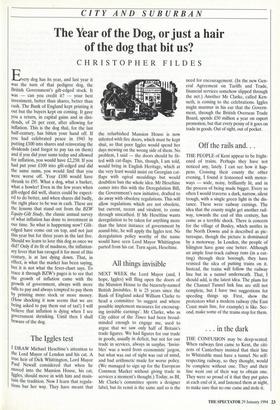All things invisible
NEXT WEEK the Lord Mayor (and, I hope, Iggles) will fling open the doors of the Mansion House to the bizarrely-named British ,Invisibles. It is 25 years since the Bank of England asked William Clarke to head a committee 'to suggest and where possible implement measures for encourag- ing invisible earnings'. Mr Clarke, who as City editor of the Times had been broad- minded enough to engage me, used to argue that we saw only half of Britain's trade figures. We had figures for our trade in goods, usually in deficit, but not for our trade in services, always in surplus. `Invisi- bles' was a word from economists' jargon, but what was out of sight was out of mind, and bad arithmetic made for worse policy. (We managed to sign up for the European Common Market without giving trade in services a moment's thought.) Today, as BI, Mr Clarke's committee sports a designer label, but its remit is the same and so is the need for encouragement. (In the new Gen- eral Agreement on Tariffs and Trade, financial services somehow slipped through the net.) Another Mr Clarke, called Ken- neth, is coming to the celebrations. Iggles might murmur in his ear that the Govern- ment, through the British Overseas Trade Board, spends £50 million a year on export promotion, but that every penny of it goes on trade in goods. Out of sight, out of pocket.


































































 Previous page
Previous page